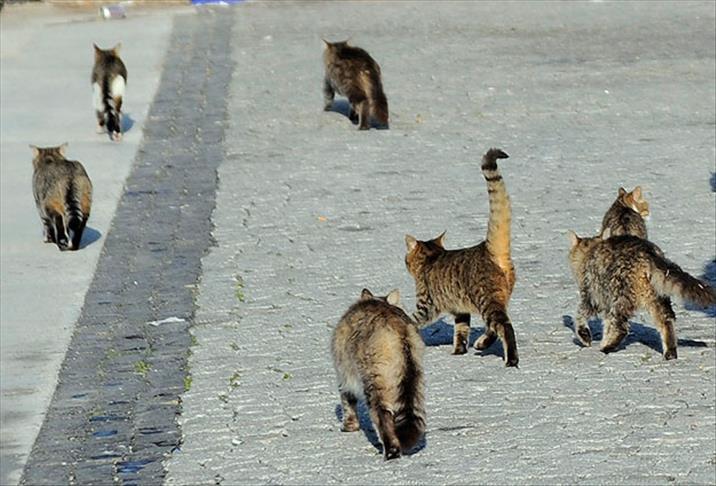Greece: Law seems ill fit for animal cruelty problem
Greece proposes law softening penalties for animal abuse, in contrast to its animal-friendly tourist image

Atina
By Magda Panoutsopoulou
ATHENS
This March the animal welfare society of Karditsa in northern Greece uncovered a horrific sight: a cat trapped in a cage and speared with a harpoon.
The perpetrator, a 60-year-old man, claimed that the cat was eating his birds and that he was unaware of the existence of animal abuse laws. (After surgery, the cat survived, facing a long recovery in a new home.)
A week before, news emerged that two soldiers had abused a dog by throwing him off a cliff, laughing and filming the incident.
The dog was never found.
These are just two incidents of the brutal reality of animal abuse in Greece and what animal welfare societies and volunteers must deal with on what they say is almost a daily basis.
It is unfortunately not unusual to find newborn puppies or kittens thrown into the garbage alive or drowned, especially in the countryside, say the groups.
Despite these incidents and many more of a similar nature, Greece’s Agriculture Ministry this spring introduced a bill that would have moved things in the opposite direction.
It proposed punishing people who care for strays, fining vets for helping animals lacking an identifying microchip, and slapping pet owners with new fees and taxes.
Most gravely, it proposed softening penalties for animal abuse offenses.
The proposal caused an uproar among animal activists and groups, who demanded it be withdrawn, and indeed it was, only for the minister responsible to pledge to re-introduce it at a later date.
Turkey seeks tougher penalties
Amid these efforts in Greece to make helping animals more difficult and soften punishment for abusers, neighboring Turkey is, on the contrary, eyeing legislation to do more to fight animal abuse.
Last month, on the eve of national elections, an incident of animal cruelty took place that sparked outrage. A puppy was found almost dead, with four of its feet cut off, in Sapanca in the western province of Sakarya.
Separately, allegations that horses that pull carriages on Istanbul’s scenic Princes' Islands suffer from abuse -- overworked and lacking adequate veterinary care -- drew similar protests.
On June 16, President Recep Tayyip Erdoğan -- set for reelection just over a week later -- vowed to toughen Turkey’s animal protection laws. Calling protecting animals “part of our belief, our humanity” on Twitter, he said a new law on animal rights would be “prioritized” following the elections.
As for Greece, “the phenomenon of animal abuse is very common. There are laws against abuse and prison terms as well as fines, but they are rarely applied,” said Teresa Exarchou, head of the Animal Welfare Committee of the Municipality of Kifisia, a north Athenian suburb.
“Despite the publicity surrounding some of the recent incidents and the tightening of arrest procedures, the police still haven’t done their part seriously by giving the attention needed,” she added.
“Greece is a country where only in recent years has animal welfare begun to grow in the public consciousness. Although there are a number of animal welfare groups and volunteers, everything starts with the right education in school and at home,” she explained.
Rise in cases
According to official police data, there were 1,900 animal abuse complaints in January-September 2017 -- the latest figures available -- compared to 1,307 for the whole of 2015 and just 809 in 2004. Of those 1,900 complaints, 938 led to a criminal investigation, and 157 suspects were arrested.
It is not clear whether these numbers represent a rise in actual cases or whether more cases that do exist came to light.
“The problem is still deeply rooted, and it will take time and much suffering for the animals and those who are defending their rights to change the situation,” Themis Dimitrakopoulos, a member of Greece’s ruling Syriza party dealing with animal rights, told Anadolu Agency.
“Animal-related legislation can be improved over time and under the pressure of the animal welfare movement, but society still remains, at least a large part of it, captive to the old-fashioned ideas about animals.”
Greece has a history of inaction when it comes to animal cruelty,” said Kirsty Kinloch, a British expatriate teacher and animal volunteer. “It is known for its cats who wander freely in the streets. These cats are used to promote the tourist trade, they're on t-shirts and calendars. Yet these same cats are poisoned and killed by the residents.
“It's a sad realization that Greece, a civilized and friendly country, is also home to some of the worst incidents of cruelty towards animals.”
Anadolu Agency website contains only a portion of the news stories offered to subscribers in the AA News Broadcasting System (HAS), and in summarized form. Please contact us for subscription options.

